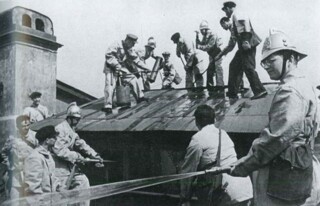Fireman Shostakovich
Anna Aslanyan
On 20 July 1942, Time magazine led with a story on ‘Fireman Shostakovich’. ‘Amid bombs bursting in Leningrad he heard the chords of victory,’ the caption on the cover said, under a picture based on a Soviet propaganda photo taken on the roof of the Leningrad Conservatoire in September 1941. Shostakovich’s Seventh Symphony, dedicated to the besieged city of Leningrad, had received its American premiere on 19 July 1942, played by the NBC Symphony Orchestra under Arturo Toscanini. On 22 June, the first anniversary of the Nazi invasion of the Soviet Union, it was broadcast live by the BBC: the London Philharmonic Orchestra conducted by Henry Wood raced through the score, finishing four minutes earlier than the scheduled time, to the studio manager’s dismay.
Shostakovich began work on the piece in July 1941 and finished it in December, in the city of Kuibyshev. The symphony was first performed there on 5 March 1942. Meanwhile in Leningrad, the most devastating winter of the siege was drawing to an end, with the daily bread ration going down to 250 grams for workers and 125 grams for white collars and their dependants, and yet there was music in the city. The conductor Karl Eliasberg resurrected the Leningrad Radio Orchestra to perform the Seventh Symphony on 9 August 1942. The story is at the centre of Leningrad and the Orchestra That Defied Hitler, a new documentary directed by Tim Kirby, to be aired on BBC2 tonight.
One of the interviewees recalls her 18th birthday in January 1942, when she put her grandfather’s body on a sledge and took it away. She remembers seeing a Christmas tree with what looked like parcels under it and then realising they were dead children. Her voice sounds incredibly young when she talks about the performance in the Philharmonic Hall, which looked just the same as ever, and the sense of elation everyone felt as they listened to Shostakovich’s music.
The symphony was recently performed by the St Petersburg Symphony Orchestra, conducted by Maxim Shostakovich, the composer’s son. ‘I was scared,’ he says in the film when he remembers attending the Kuibyshev premiere as a three-year-old. He also describes his father’s visit to the ‘confession factory’ on Liteyny Avenue. Shostakovich sat in the waiting-room until someone told him the investigator who had summoned him no longer worked there, having already been shot.
When the score of the symphony was flown to Leningrad in July 1942, Eliasberg thought: ‘We’ll never play this.’ The piece, 78 minutes long, written for an orchestra of more than a 100, is physically demanding, and some of the starving musicians could barely carry their instruments. On learning that the drummer Zhavdet Aydarov had died, Eliasberg went to the makeshift mortuary to pay his respects. Leaning close to the body, the conductor heard the drummer breathing. Aydarov was saved and went on to play on 9 August; for the ‘invasion theme’, the snare drum repeats a two-bar pattern 171 times.
The Leningrad performance was broadcast both to the nation and to the enemy. Years later, visiting the USSR as tourists, a couple of former German officers sought out Eliasberg to shake his hand (he refused) and to tell him it was the music coming out of front-line loudspeakers in 1942 that made them realise they’d lost the war.

Comments
Many Western military observers have noticed a new professionalism and zeal within the Russian armed services. David Habbakuk, the British journalist, in the US "Sic Semper Tyrannis" intelligence blog, dates this to a precise occasion:
"In the aftermath of the Georgian attack on South Ossetia, it turned out that perhaps the most famous 'Russian' conductor in the West, Valery Gergiev, was not Russian at all: he was an Ossete. And he took his Marinsky Orchestra to Tskhinvali. As the darkness fell in front of the town hall, he played Shostakovich's Seventh Symphony. (See https://www.youtube.com/watch?v=gKqSTPNCsMM .) It seemed to me likely that there was an allusion intended to the evening of 9 August 1942, the day Hitler had intended would celebrate the fall of Leningrad with a lavish banquet at the city's Astoria Hotel. On that day Lieutenant-General Leonid Gorovov, the artilleryman who a key to the defence of the city, unleashed a bombardment on the German positions, so the hall could be lighted up as Karl Eliasberg conducted his half-starved orchestra. (Apparently Govorov later remarked to Eliasberg that: 'we played our instruments in the symphony too, you know'.) So, the stage was set by the Georgian War for a radical change, in which, among other things, the military again became a far more natural place for young people of energy and ability who want an adventurous and honourable profession."
http://turcopolier.typepad.com/sic_semper_tyrannis/2015/10/a-few-observations-by-david-habakkuk.html
On the youtube recording of the final movement, the audience can be seen to be full of rapt young Russian soldiers.